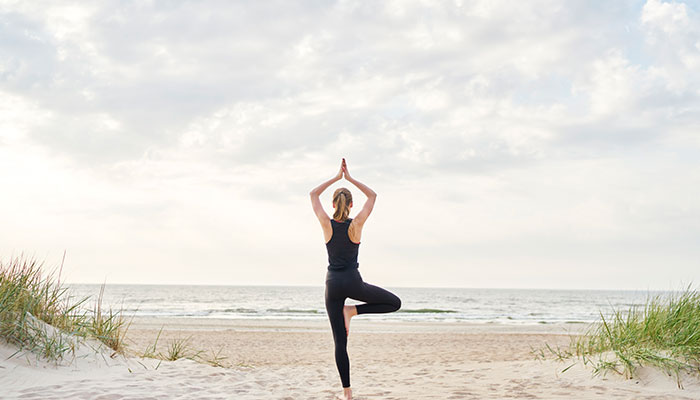As people rush to fill their trolleys in shopping centres, world news bulletins fill with reports on the spread of COVID-19 and all major public events now on hold, it’s not surprising that there’s a huge rise in people feeling anxious.

Rational: Anxiety about real fears keeps us safe, ,says Distinguished Profesor Ron Rapee.
Illness anxiety is a recognised psychological phenomenon, says Distinguished Professor Ron Rapee of Macquarie University’s psychology department.
But concern about an illness that is real and could potentially do harm, and which we see causing havoc in other countries, is actually a rational and helpful fear, he says.
“It’s really a line-ball call on what level of anxiety is rational and what level is problematic,” says Rapee, who is also the Founding Director of the Centre for Emotional Health.
He says it can be difficult to judge when a person is reacting in a way that is disproportionate to the amount of danger, particularly when we there are so many signals sent to us, to show that there is something to be concerned about.
“Anxiety is a normal and critically important emotion that we all experience, and its function is to protect us from danger,” he says. It’s anxiety that is helping to motivate people to engage in the necessary social distancing, hand washing and isolation that will help them to be safer.
Fears around illness and physical harm are a very common area of anxiety because that's a way in which people genuinely can die., he says.
Avoid highly emotional news sources and look for official sources of information which will be much more measured.
“As a species, we should be cautious around disease – all species are primed to learn to avoid things that could kill them like diseases, that’s very normal.”
Toilet roll rush is a safety behaviour
The strange behaviours in our society at large around mass purchase and hoarding of toilet paper, certain dry goods and hand sanitisers are likely symptomatic of illness anxiety for many people, Rapee says.
“The shopping phenomenon is the ultimate example of FOMO (Fear of Missing Out),” he says. “But it's also symptomatic of what behavioural psychology calls ‘safety behaviours’.’”
Safety behaviours are sometimes used to avoid a situation that people feel highly anxious about.

Breathe: Try to use rational language, keep things in proportion and follow official advice, sayd Rapee.
In behavioural terms, one of the main manifestations of all forms of anxiety is avoidance behaviour. Avoiding doesn’t always mean doing nothing – and in this case, shopping to stock up on toilet paper – no matter how irrational this may appear, is something many people are likely doing to make themselves feel safer, even though it has nothing to do with the illness.”
The initial, rational response can get lost in the noise of overwhelming anxiety, he explains.
“Someone may think, I need to make sure I have enough rolls for two weeks. But then anxious thinking takes over and that’s where the rationality part gets lost. People just start buying more and more and more toilet paper without thinking about why or what they are doing.”
Keep calm and follow these four tips
Professor Rapee lists some helpful ways to reduce anxiety without stripping the shelves of loo rolls.
1) Use rational language
In social media, in news headlines and in everyday discussions, there’s a tendency for people to start to use very emotive terms, such as ‘killer virus’ and ‘destruction’ and so on, and then to feed off each other. That can make us get more emotional in the way we respond to information. Avoid highly emotional news sources and look for official sources of information which will be much more measured.
2) Keep things in proportion
We know that fears in general can be reduced when we teach people to think more factually and more realistically about what's going on. Look at the facts and figures: what proportion of people are likely to catch the disease, and of these, what proportion actually do end up being severely sick and die? Put that in the context of other things such as, the proportion of people who are killed by the flu every year, the proportion of people killed by a heart attack or a car accident every year. That lets people realise, that while COVID19 is something we need to take seriously, it's not necessarily something we need to be terrified of.
3) Follow official advice
One way to reduce fear is to reduce the danger. If you are actively engaged in social distancing, hand-washing and generally safe behaviours, that in turn should reduce your anxiety. The fears are reduced by a combination of undertaking the recommended safety precautions and at the same time, also trusting in them.
4) Balance safe behaviours with their impact on your life
That’s a judgement call that each person needs to make. So, if you are keeping out of danger by never leaving your house, you are stopping yourself from getting sick. But at the same time, you may be missing out on a whole lot of things that are important to you. Perhaps you aren’t exercising because you are staying home. But with care, you could walk somewhere where there weren’t many people, for example. Every person needs to have a look at their own life and get that balance right for themselves.
Professor Ron Rapee is an ARC Australian Laureate Fellow and Distinguished Professor in the Department of Psychology and Centre for Emotional Health.



